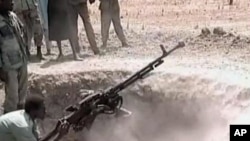While many people celebrate South Sudan’s independence, aid agencies warn the new nation still faces many problems. Doctors Without Borders, also known as MSF, says South Sudan is experiencing a “massive humanitarian emergency” that could continue for years.
“I think it is something that after the celebrations will need a lot of attention in the future,” said Jose Hulsenbek, head of mission for Doctors Without Borders in South Sudan. “The access of health care for the people is still extremely minimal. I mean we estimate that about 70 percent of the population has no access to basic, basic health care.”
Most of the health care services in South Sudan are provided by NGOs and U.N. and international agencies.
“It is going to be a while before the government will reach a level where they can actually provide that health care,” she said, “I just hope that the development that will come will not make people forget that there are some very critical things that will always be on going and need immediate attention.”
Big concerns
Among the major health concerns are disease and the effects of violence, as well as maternal and child care and chronic child malnutrition
“The other thing is we are in the midst of an outbreak of a parasitic disease called kala azar,” she said. It’s considered the most severe form of leishmaniasis and is fatal if left untreated. MSF said it’s a difficult disease to treat and lack of access to medical care makes the situation even worse.
“The government is not able to respond to this outbreak. Last year, we saw eight times more cases of kala azar than we’ve seen in previous years. So, we are preparing for this outbreak to continue. It’s a disease that is cyclical. Outbreaks like this do happen every couple of years, eight to 10 years officially. And we are unfortunately in the midst of that,” said Hulsenbek.
Women and kids
MSF reports that South Sudan has some of the highest maternal and infant mortality rates in the world.
“For many months of the year, people have less access than normal to health care. During the rainy season, a pregnant woman may have to walk two or three days while in labor to access a clinic to get treatment if there are complications during the birth,” said the MSF head of mission.
As for children, Hulsenbek said, “There are a lot of very easily treatable diseases, but because they cannot make it to a clinic to receive this treatment…there are so many children who die.”
Returning home
It’s estimated about 300,000 people have returned to the south from the north in recent years, placing a greater strain on the system.
It’s just literally an increase in population, which means there are more people coming to the clinics. But…it puts a strain on all the services that are provided,” she said.
For example, the growing population means more food is needed. “That’s one of the reasons why we’re seeing malnutrition in certain areas,” she said.
MSF currently provides health services in 13 locations in eight states, including primary health care, hospitals, maternity care, nutrition centers and HIV and TB care and treatment.




